11 Best Ecommerce Platforms to Manage Your Online Business
The best ecommerce platforms not only simplify technical aspects but also enable efficient store management with fewer team members.
Here are the ones you should look out for:
1. BigCommerce
BigCommerce is a leading SaaS ecommerce platform. It empowers you to establish and manage your online stores effortlessly.
Operating on the cloud eliminates the need for self-server software installation or maintenance.
BigCommerce offers diverse storefront templates and themes for a visually appealing online store. You can further tailor the design to align with your brand's identity.
Adding, managing, and selling products online becomes seamless with BigCommerce. You can create unlimited product listings, configure product variants, and monitor inventory levels efficiently.
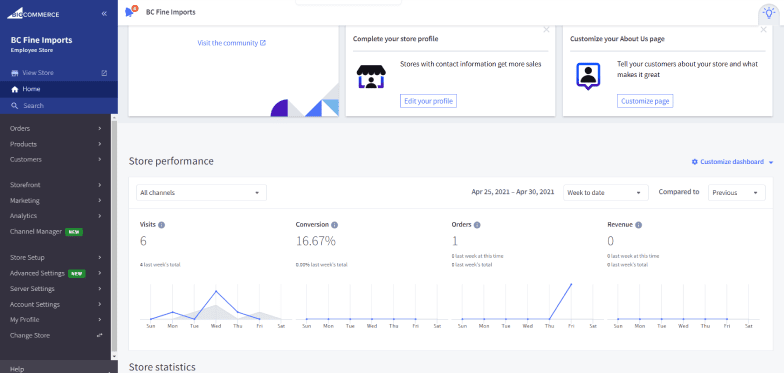
BigCommerce seamlessly integrates with various payment processors. This enables you to accept credit cards, debit cards, and other payment methods from your customers. It also integrates with multiple shipping carriers.
One feature you won’t find on most of its alternatives is BigCommerce’s suite of marketing and SEO tools. These help promote your online store and attract new customers effectively.
As a PCI-compliant platform, BigCommerce prioritizes the safety and security of your customers' data, offering peace of mind.
A great example of a store that uses BigCommerce is Skullcandy’s online shop.
Whether you're a small business or a large enterprise, BigCommerce caters to all ecommerce needs. Its scalability ensures growth alongside your business, supported by a plethora of features and integrations.
Key Features
- Robust SEO tools: BigCommerce offers powerful built-in SEO tools to optimize your ecommerce store for search engines.
- Multi-channel selling: Easily expand your reach by selling on various platforms like Amazon, eBay, and social media, directly from your BigCommerce store.
- Responsive checkout: Provides a mobile-responsive checkout process, reducing cart abandonment rates.
- Advanced analytics: Gain valuable insights into your store's performance with detailed analytics and reporting, helping you make data-driven decisions.
Pros
- You can customize your store extensively.
- Robust SEO tools for higher rankings.
Cons
- Higher pricing compared to some competitors.
- A limited number of free templates are available.
Pricing
- Standard: $39/month
- Plus: $105/month
- Pro: $399/month
- Entrepreneur: Contact their sales team for a custom quote.
2. Shopify
Shopify is a cloud-based ecommerce platform. It simplifies online store creation and management, which makes it a preferred choice for small businesses and large enterprises alike.
Shopify offers diverse storefront templates and themes. These allow customization to align with your brand's identity.

Adding, managing, and selling products online becomes seamless with Shopify. Shopify allows for unlimited product listings. It also lets you easily configure product variants, and manage inventory levels efficiently.
Shopify seamlessly integrates with various payment processors. Options include PayPal, Stripe, and Verifone. Shopify also equips you with a suite of marketing and SEO tools to promote your online store and attract new customers effectively.
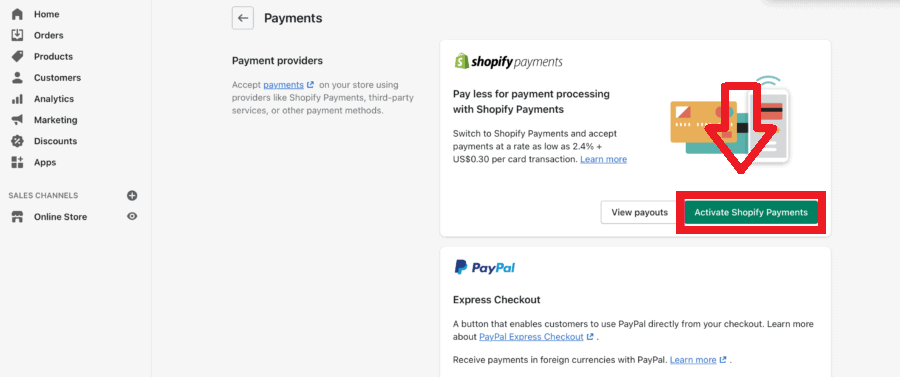
The best part about setting up a Shopify store is how easy it is to use.
Regardless of your coding expertise, Shopify simplifies the process of establishing a professional-looking online store.
Key Features
- User-friendly interface: Set up your online store with ease, even if you’re a beginner.
- Abandoned cart recovery emails: Utilize automated email reminders to recover lost sales by encouraging customers to complete their purchases.
- Payment gateway integration: Choose from a variety of payment gateways to provide secure and convenient payment options for your customers.
- App store: Access several apps and plugins to add extra functionality and features to your Shopify store, tailored to your needs.
Pros
- User-friendly interface for a quick setup process.
- Extensive app store for added functionality.
Cons
- Transaction fees if not using Shopify Payments.
- Limited free themes with fewer customization options.
Pricing
- Basic: $25/month
- Shopify: $65/month
- Advanced: $399/month
3. WooCommerce
WooCommerce is an open-source ecommerce plugin designed for WordPress. It boasts global popularity as the most utilized ecommerce platform, with a market share of 38.74%.
WooCommerce provides an array of storefront templates and themes, granting the flexibility to tailor your store's appearance to harmonize with your brand.
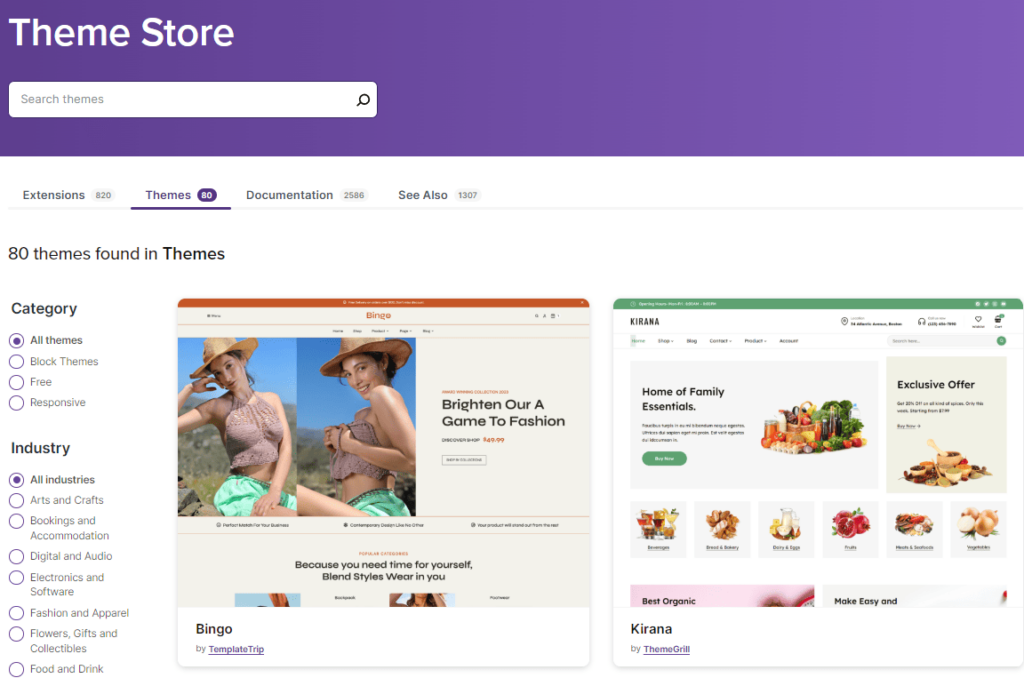
Handling products becomes a breeze with WooCommerce. You can create limitless product listings, configure product variations, and closely monitor inventory levels.
WooCommerce seamlessly integrates with various payment processors. Not only does it accept credit cards and debit cards, but other payment options such as Venmo too.
The platform also integrates seamlessly with various shipping carriers, allowing you to offer diverse shipping choices to enhance the customer experience.Its seamless integration with WordPress also means you get statistics, sale amounts, and recent reviews right on your WordPress dashboard.
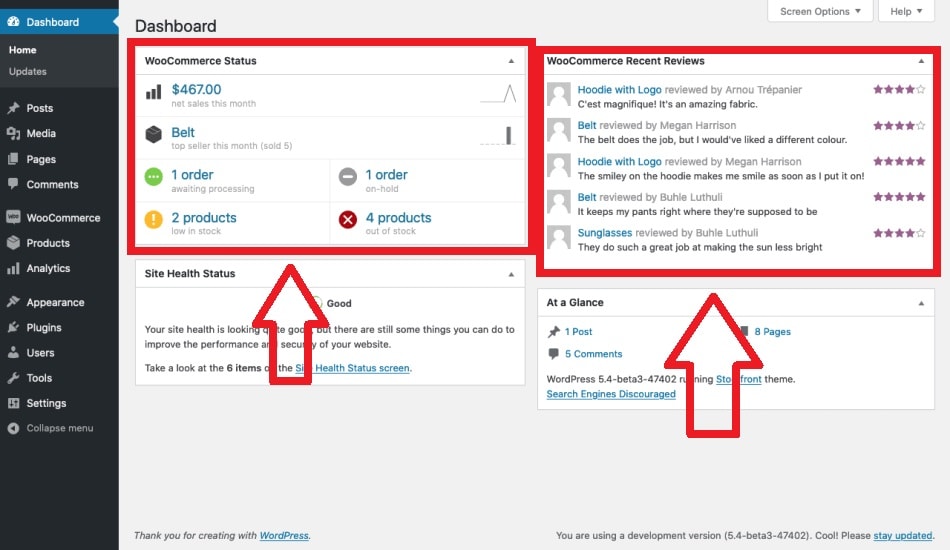
Bonus resources: You may also want to discover where WooCommerce stands against other ecommerce platforms like BigCommerce and Shopify.
Key Features
- WordPress integration: Seamlessly integrate ecommerce functionality into your WordPress website, leveraging the benefits of both platforms.
- Customization options: Enjoy extensive design and feature customization options to create a unique ecommerce experience for your customers.
- Inventory management: Efficiently manage your products, track stock levels, and receive notifications for low inventory.
- Payment flexibility: Offer various payment methods, including PayPal, credit cards, and more.
Pros
- Fully integrated with WordPress.
- Offers flexibility in design and functionality.
Cons
- Requires WordPress hosting and maintenance.
- You need to invest in add-ons for added functionality.
Pricing
- The basic platform is free to use but with limited functionalities. To use any extra features, you need to purchase and install add-ons, which vary in price.
4. Shift4Shop
When it comes to finding the best ecommerce platform, Shift4Shop (formerly 3dcart) shines as a cloud-based solution tailored to businesses of all sizes. It offers a wealth of features for building and promoting successful online stores.
Renowned for its robust capabilities and customization potential, it's an excellent choice for those seeking a comprehensive ecommerce solution.
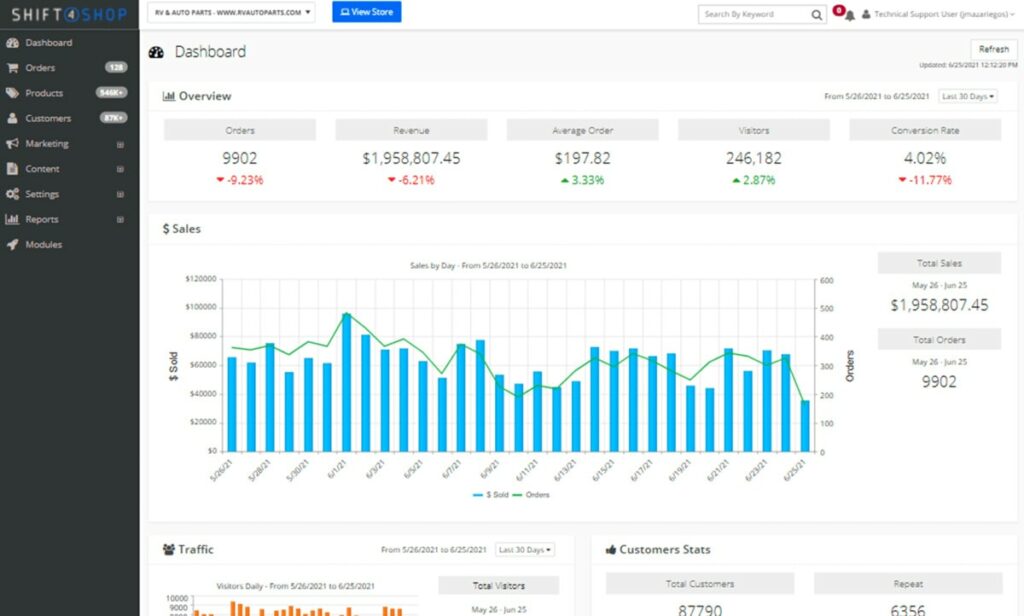
With Shift4Shop, building a professional online store is a breeze, even without coding expertise. Choose from a diverse array of templates and themes, and tailor your store's design to align perfectly with your brand.
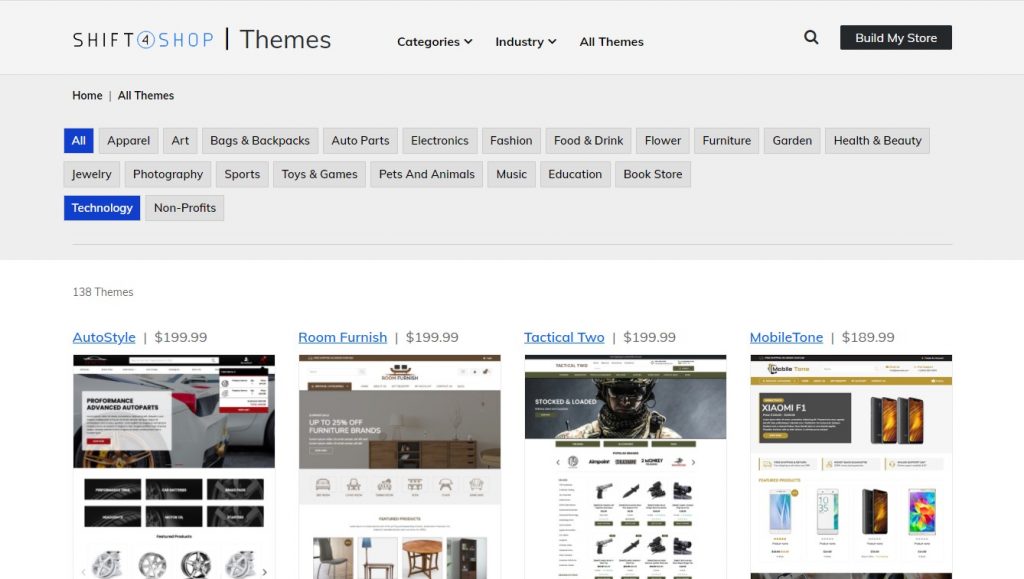
Thanks to Shift4Shop’s drag-and-drop page builder, crafting custom pages and layouts becomes effortlessly achievable.
You can effortlessly create unlimited product listings, establish product variants, and closely monitor inventory levels. Shift4Shop offers a range of product management tools, including bulk editing, product options, and the ability for customers to leave product reviews.
Here’s how simple it can be to manage your product listing on Shift4Shop:
Integrating with a multitude of shipping carriers, Shift4Shop enables you to provide customers with diverse shipping options. Real-time shipping rates, shipping label creation, and package tracking are among the invaluable shipping tools at your disposal.
Beyond its core offerings, Shift4Shop provides a plethora of add-ons and integrations that expand your online store's functionality. Whether it's adding a blog, integrating it with social media, or creating a bespoke mobile app, this platform empowers you to enhance your ecommerce presence.
Key Features
- SEO-friendly URLs: Shift4Shop allows you to create SEO-friendly URLs, helping your products and pages rank higher in search engine results.
- Abandoned cart saver: Recover lost sales with automated email reminders and incentives, reducing cart abandonment and increasing revenue.
- Secure checkout: Offer a secure shopping experience with multiple payment options and built-in SSL certificates to build trust with customers.
- Product reviews: Encourage user-generated content (UGC) by allowing customers to leave product reviews, boosting SEO and credibility.
Pros
- Robust SEO tools for better visibility.
- Excellent for small and medium-sized businesses.
Cons
- Some advanced features require higher plans.
- Template options could be more diverse.
Pricing
- Free to use, as long as you ship more than $500 a month.
- If not, it starts at $29 a month for new users.
5. Wix
Wix, a cloud-based website builder, extends its capabilities to encompass ecommerce features. This platform particularly appeals to small businesses and individuals seeking to establish an online store without the need for coding skills or hiring web developers.
Here’s how easy it is to build your ecommerce website on Wix:
Wix offers a selection of storefront templates and themes, which can be customized to meet your brand’s aesthetics. The drag-and-drop editor is designed to help you build your ecommerce store without any coding or design experience.
Wix offers easy product management features to help you add, organize, and sell products online. The platform accommodates unlimited product listings, multiple product variants, and inventory tracking options.
Wix offers an extensive marketplace for third-party apps and integrations. This enables businesses to expand the functionality of their online stores.
Whether it's adding customer support chat, integrating it with accounting software, or enhancing the user experience with specialized features, the Wix App Market has it all.
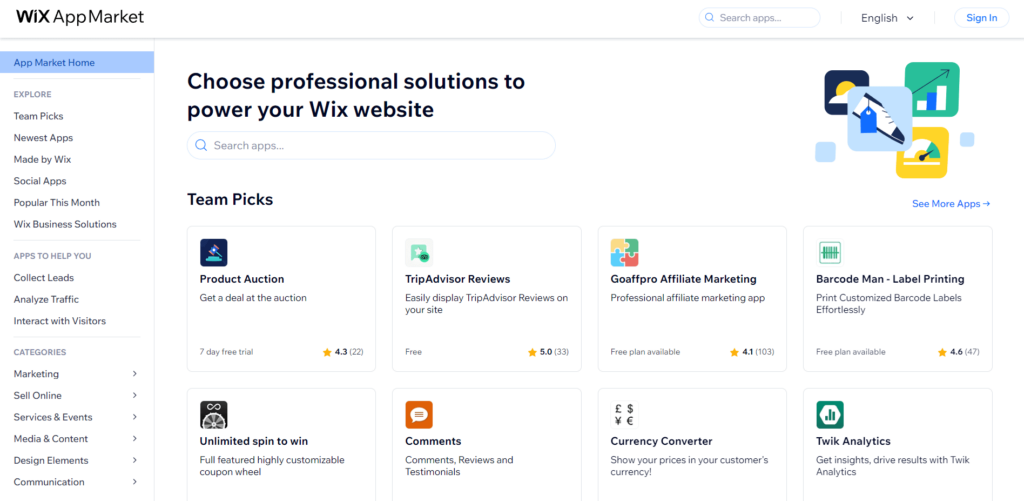
Key Features
- A drag-and-drop website builder: Create a stunning ecommerce website with ease using Wix's intuitive drag-and-drop builder.
- Mobile optimization: Ensure your online store looks and functions flawlessly on mobile devices, improving user experience and search rankings.
- App market: Access a wide range of apps in the Wix App Market to add extra functionality and features to your ecommerce site.
- Inventory management: Efficiently track and manage your product inventory with Wix's inventory management tools.
Pros
- User-friendly drag-and-drop website builder.
- Free plan available for small businesses.
Cons
- Limited ecommerce features on the free plan.
- Not as robust for large-scale stores.
Pricing
The prices shown here are for their ecommerce plan. Wix offers different plans for creating and hosting a website separately. The ecommerce plan includes features such as online payments, which is essential for any ecommerce business.
- Business Basic: $17/month
- Business Unlimited: $25/month
- Business VIP: $35/month
6. OpenCart
OpenCart, as a free and open-source ecommerce platform, provides businesses of all sizes with the tools to create an ecommerce store.
At its core, OpenCart excels in providing you with the tools to design and customize your online storefronts. It offers a diverse selection of templates and themes to help you match your site with your brand’s style.
With this in mind, OpenCart’s open-source nature means that it is highly customizable. The themes on offer are quite limited. To fully make use of all OpenCart offers, you’ll need coding experience.
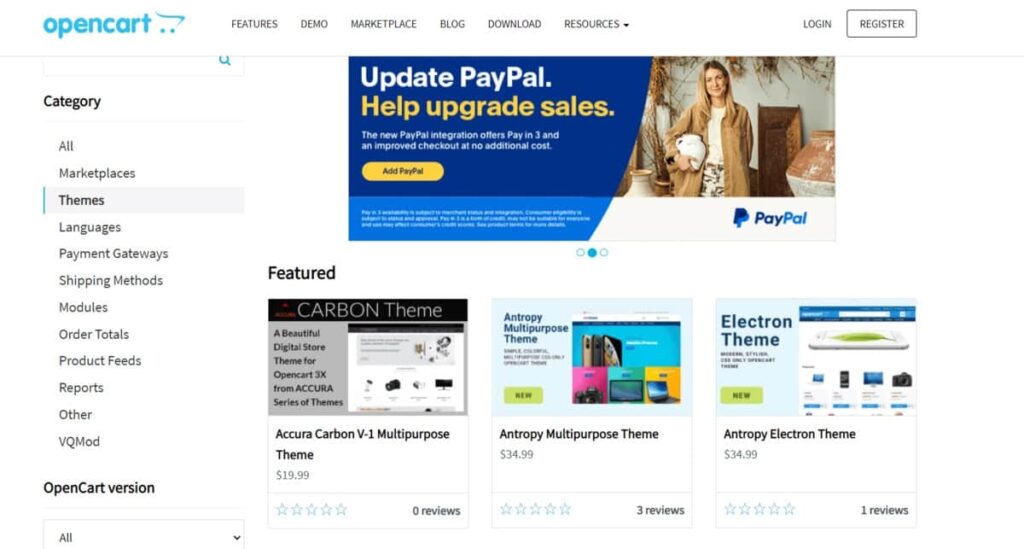
Managing products becomes effortless with OpenCart. You can seamlessly add, categorize, and showcase products online. Its capabilities extend to unlimited product listings, variant management, and real-time inventory checking.
The platform also excels in payment processing, offering integration with various payment gateways such as PayPal, Skrill, and even bank transfers. OpenCart ensures secure and seamless transactions for customers, fostering trust and convenience.
Key Features
- Speed and efficiency: OpenCart is known for its lightweight architecture, ensuring fast page loading times.
- Multi-language support: Easily target international markets by offering your ecommerce store in multiple languages.
- User-friendly admin panel: Manage your store effortlessly with an intuitive admin panel that allows you to update products, prices, and promotions with ease.
- Extensions and themes: Access a wide range of extensions and themes to customize your store's appearance and functionality.
Pros
- Lightweight and fast for small to medium stores.
- Multiple language and currency support.
Cons
- Limited scalability for large enterprises.
- May require technical expertise.
Pricing
Their basic ecommerce platform is free to use. If you’d like to use their cloud hosting service as well, the pricing options are as follows:
- Bronze: $99/month
- Silver: $149/month
- Gold: $229/month
7. PrestaShop
PrestaShop, an open-source ecommerce platform, offers versatility in creating and managing online stores of all sizes. It is favored by businesses of all sizes, from small enterprises to large corporations, for its adaptability and extensive features.
PrestaShop simplifies the process of creating a professional-looking online store. Choose from a variety of templates and themes, and customize the design to align with your brand.
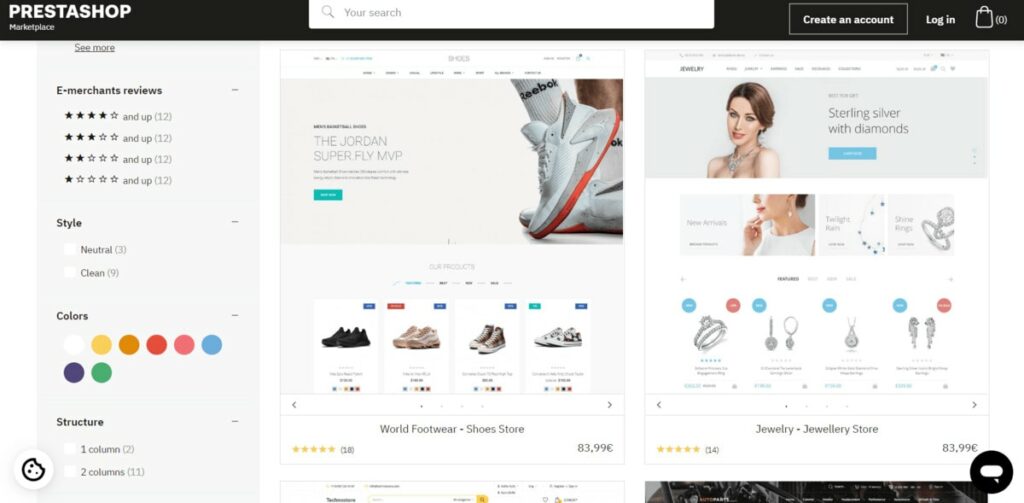
PrestaShop streamlines product catalog management. This process makes configuring your product listings and keeping track of them easy and convenient.
It seamlessly integrates with various payment processors, ensuring convenient acceptance of credit and debit card payments. Payment options include PayPal, as well as support for over 20 currencies worldwide.
Utilize PrestaShop's integrated marketing and SEO tools to boost your online store's visibility. Leverage built-in marketing tools to create and send email campaigns. It can also manage your social media presence and execute paid advertising campaigns efficiently.
PrestaShop provides a comprehensive suite of tools for streamlined order and customer management along with detailed reporting. Effectively track sales, manage inventory, and offer exceptional customer support.
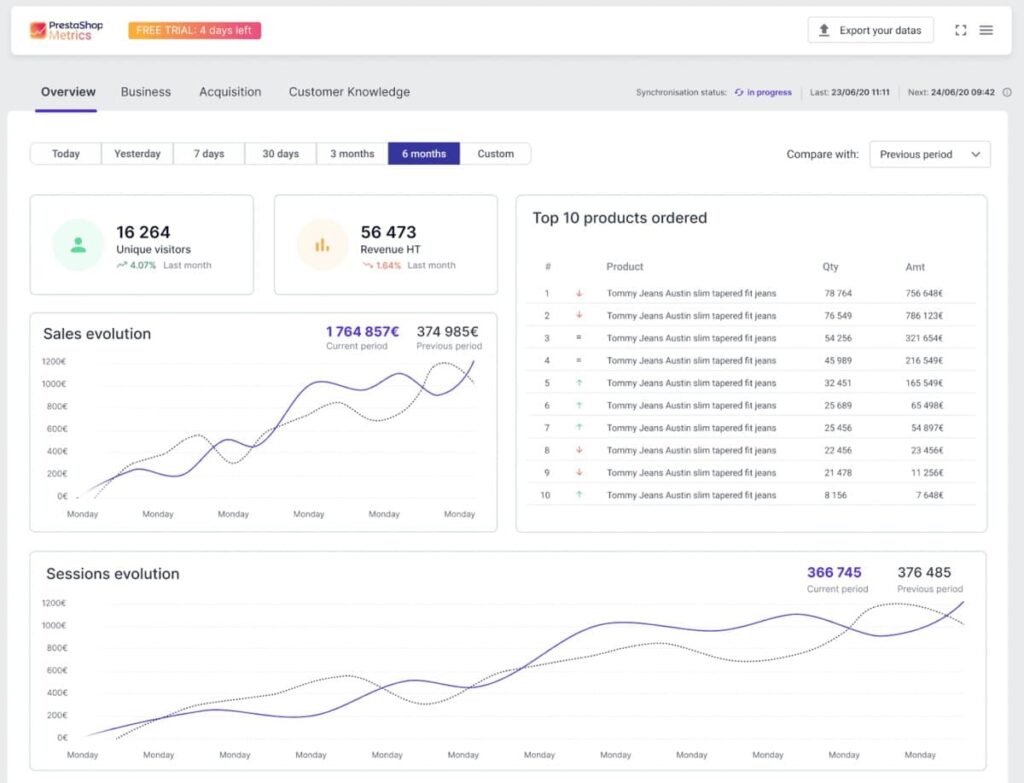
Key Features
- Free and open-source: PrestaShop is an open-source platform, saving you money on licensing fees and allowing for extensive customization.
- Responsive design: Ensure a seamless shopping experience across devices with responsive themes.
- Advanced analytics: Utilize detailed analytics and reporting tools to track sales, visitor behavior, and other crucial ecommerce metrics.
- Multi-store management: Manage multiple online stores from a single dashboard, streamlining your operations and saving time.
Pros
- Free and open-source platform.
- Supports multilingual and multicurrency stores.
Cons
- Limited native features compared to some.
- Smaller user community.
Pricing
- Prestashop is free to use, but various integrations can cost anywhere from $30 to $200 each.
8. Squarespace
Squarespace is another cloud-based website builder and content management system (CMS) geared towards users who don’t have much coding experience.
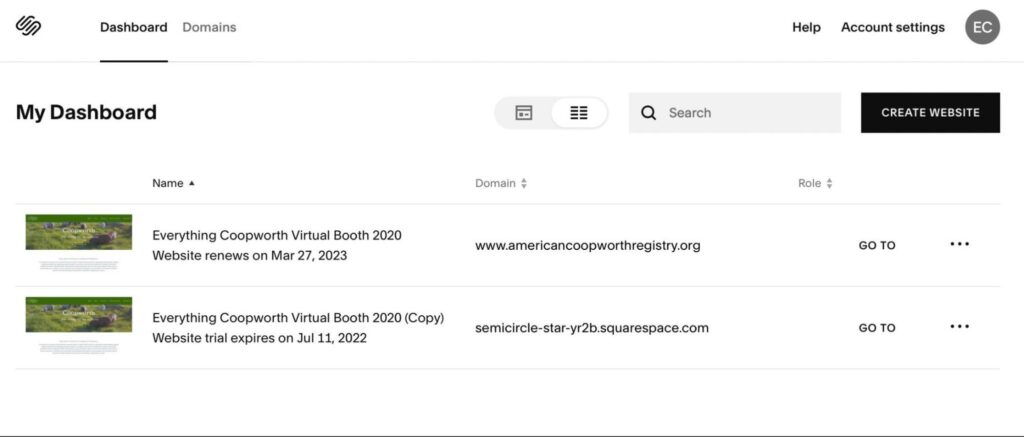
This platform offers a variety of storefront templates and themes, enabling you to customize your store's design to align with your brand.

Managing, adding, and selling products online is super easy with Squarespace. You can create unlimited product listings, configure product variants, and monitor inventory levels with ease.
It offers two paid plans that are specifically designed for ecommerce businesses. This proves to be an excellent choice for small businesses and individuals looking for an accessible ecommerce platform.
These plans offer a variety of features and integrations to help you create and manage a thriving online store.
Key Features
- Visually stunning templates: Squarespace offers visually appealing templates that can make your online store stand out, attracting and retaining customers.
- Integrated blogging: Boost SEO by seamlessly integrating a blog into your ecommerce site. This will help you create valuable content and engage with your audience.
- Inventory tracking: Stay on top of your stock levels with integrated inventory management tools, preventing overselling and enhancing customer satisfaction.
- Mobile optimization: Ensure your store looks and works perfectly on mobile devices, improving search rankings and catering to mobile shoppers.
Pros
- Beautiful templates for visually appealing stores.
- All-in-one platform with hosting included.
Cons
- Limited payment gateway options.
- Not as feature-rich as some of its competitors.
Pricing
- Commerce Basic: $36/month
- Commerce Advanced: $65/month
9. Adobe Commerce (Magento)
Adobe Commerce is a robust and highly acclaimed open-source ecommerce platform. It empowers businesses to create and manage online stores with unparalleled flexibility and industry-leading scalability.
Launched in 2007 as Magento, it has grown to become one of the most prominent names in the ecommerce industry.
Adobe Commerce offers a wide array of features and capabilities that cater to the diverse needs of online retailers. This is clear when looking at their App Store, which boasts plenty of themes and extensions.
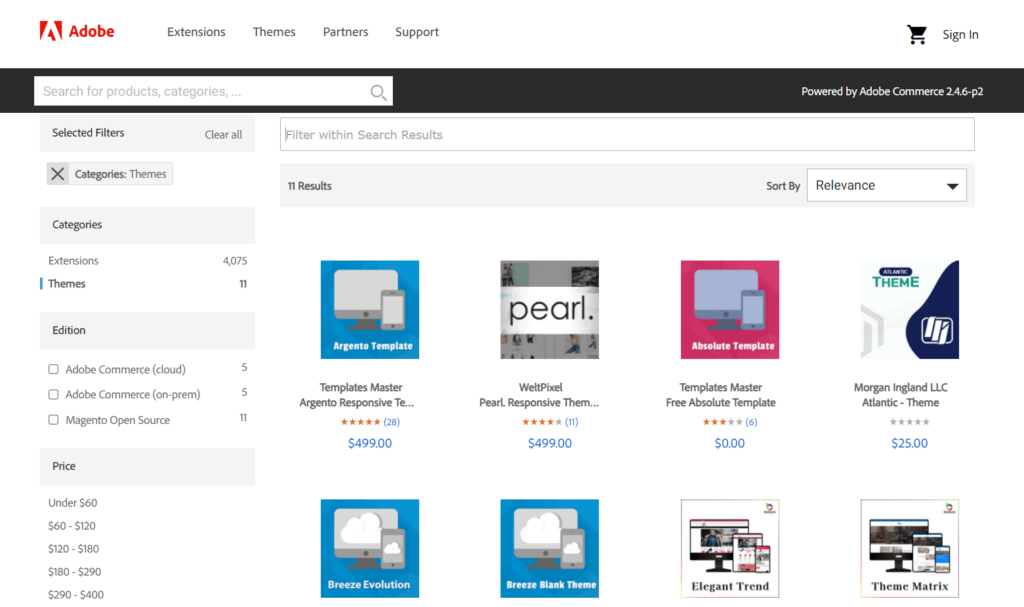
If you’re not as tech-savvy, it provides an extensive library of themes and templates that can be customized to align with a brand's identity and vision.
Online retailers can easily create and manage product listings. This includes the ability to add numerous product variants, attribute sets, and inventory tracking.
It offers a suite of marketing tools, including email marketing and social media integration. This can help you connect with your audience and drive sales.
Additionally, Adobe Commerce’s SEO capabilities empower you to optimize your online stores for search engine rankings.
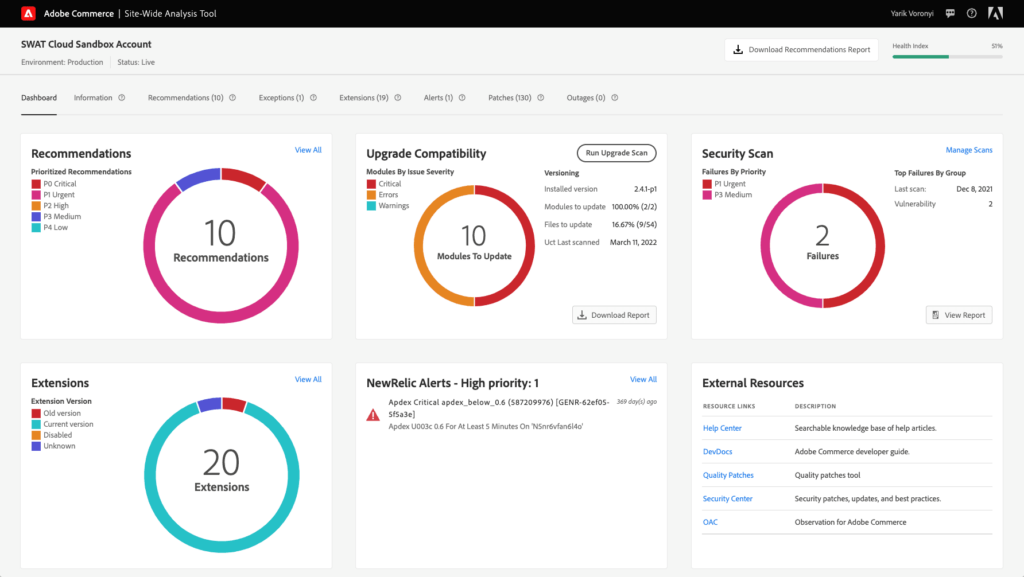
Key Features
- Scalability: Adobe Commerce is highly scalable, making it suitable for small businesses and large enterprises alike.
- Advanced product catalog: Create complex product catalogs with customizable attributes, ideal for stores with diverse product ranges.
- Internationalization: Easily cater to global audiences with support for multiple languages, currencies, and taxation rules.
- Performance optimization: Adobe Commerce offers tools and features to optimize your store's speed and performance.
Pros
- Ideal for large, complex online stores.
- High level of customization and scalability.
Cons
- Steeper learning curve for beginners.
- Costly development and hosting.
Pricing
- Contact their sales team for a quotation.
10. Weebly
Weebly, a cloud-based website builder and content management system (CMS), also integrates ecommerce functionality. It’s another ecommerce platform that enables users with all backgrounds to create an ecommerce shop without coding experience.
Here’s how easy it is to set up your own ecommerce website on Weebly:
Weebly streamlines the process of building a polished online store, catering to users without coding expertise. It offers a plethora of templates and themes for effortless customization, ensuring your store reflects your brand seamlessly.
Managing and selling products on Weebly is a straightforward process. You can effortlessly create and manage unlimited product listings. You can also configure product variants, and monitor inventory levels.
Weebly also equips you with essential product management tools, including bulk editing, product options, and product reviews.
This ecommerce platform integrates with multiple shipping carriers, enabling you to offer diverse shipping options to customers. You can access tools like real-time shipping rates, shipping labels, and package tracking.
Key Features
- A drag-and-drop builder: Weebly's user-friendly drag-and-drop builder simplifies the process of creating and customizing your online store.
- Mobile app: Manage your store on the go with the Weebly mobile app, ensuring you're always connected to your ecommerce business.
- Integrated marketing tools: Promote your products with built-in marketing tools like email marketing and social media integration to improve your SEO and reach.
- Inventory management: Keep track of stock levels and receive notifications for low inventory, ensuring you never run out of popular products.
Pros
- Intuitive website builder for beginners.
- Good for small, straightforward stores.
Cons
- Limited scalability for larger businesses.
- Fewer third-party integrations.
Pricing
- Free
- Personal: $10/month
- Professional: $12/month
- Performance: $26/month
11. Ecwid
Ecwid is a cloud-based ecommerce platform that excels at seamlessly integrating an online store with an existing website or blog. It is the perfect solution for small businesses and individuals seeking to commence online sales without creating a new website.
Ecwid simplifies the process of adding an online store to any pre-existing website or blog, irrespective of the hosting platform.
It lets you effortlessly create limitless product listings, configure product variants, and monitor inventory levels. It offers product management features such as bulk editing, product options, and product reviews.
Here’s how you can build your ecommerce shop in 10 minutes with Ecwid:
Ecwid seamlessly integrates with multiple payment processors, such as Paypal, which allows you to accept various payment methods.
It also integrates with multiple shipping carriers, providing your customers with a wide array of shipping choices. Features such as real-time shipping rates, shipping labels, and package tracking contribute to efficient order fulfillment.
You get access to a suite of marketing and SEO tools to effectively promote your online store and attract new customers. This arsenal encompasses email marketing, social media promotion, and comprehensive SEO tools.
Key Features
- Seamless integration: Easily add ecommerce functionality to your existing website or social media profiles, increasing your online presence.
- Global selling: Sell to international customers by offering multiple currencies and languages, expanding your reach and SEO potential.
- Automated taxes: Simplify tax calculations with automatic tax rates, reducing the complexity of managing taxes and ensuring compliance.
- Secure checkout: Ecwid offers a secure and hassle-free checkout experience with multiple payment options, building trust with customers and improving search rankings.
Pros
- Seamless integration with existing websites.
- Free plan available for small-scale stores.
Cons
- Limited design customization options.
- May require additional apps for advanced features.
Pricing
- Free
- Venture: $19/month
- Business: $39/month
- Unlimited: $99/month
Are You Ready to Leverage the Best Ecommerce Platforms?
Now that you've explored these top ecommerce platforms, you're better equipped to make an informed choice for your online business.
Whether you're a small business owner or part of a larger enterprise, the right platform can propel your ecommerce venture to success. Evaluate your specific needs, budget, and goals to find the perfect fit among these versatile options.
Get ready to unlock the full potential of your online store with the best ecommerce platform for your unique requirements.






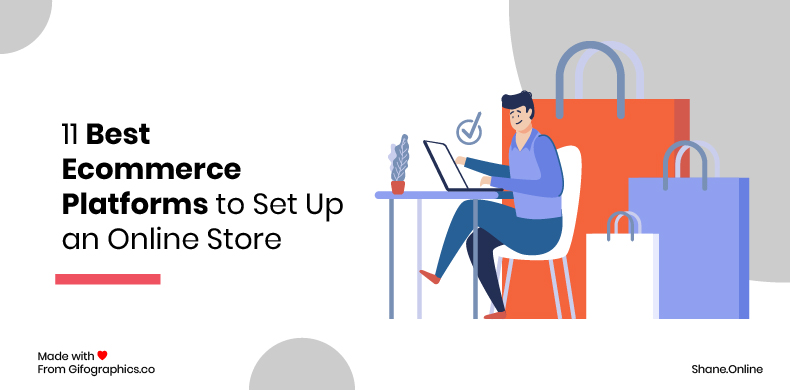
![top b2b ecommerce platforms for [year] 18 top b2b ecommerce platforms](https://shanebarker.com/wp-content/uploads/2022/04/Top-B2B-Ecommerce-Platforms.jpeg)
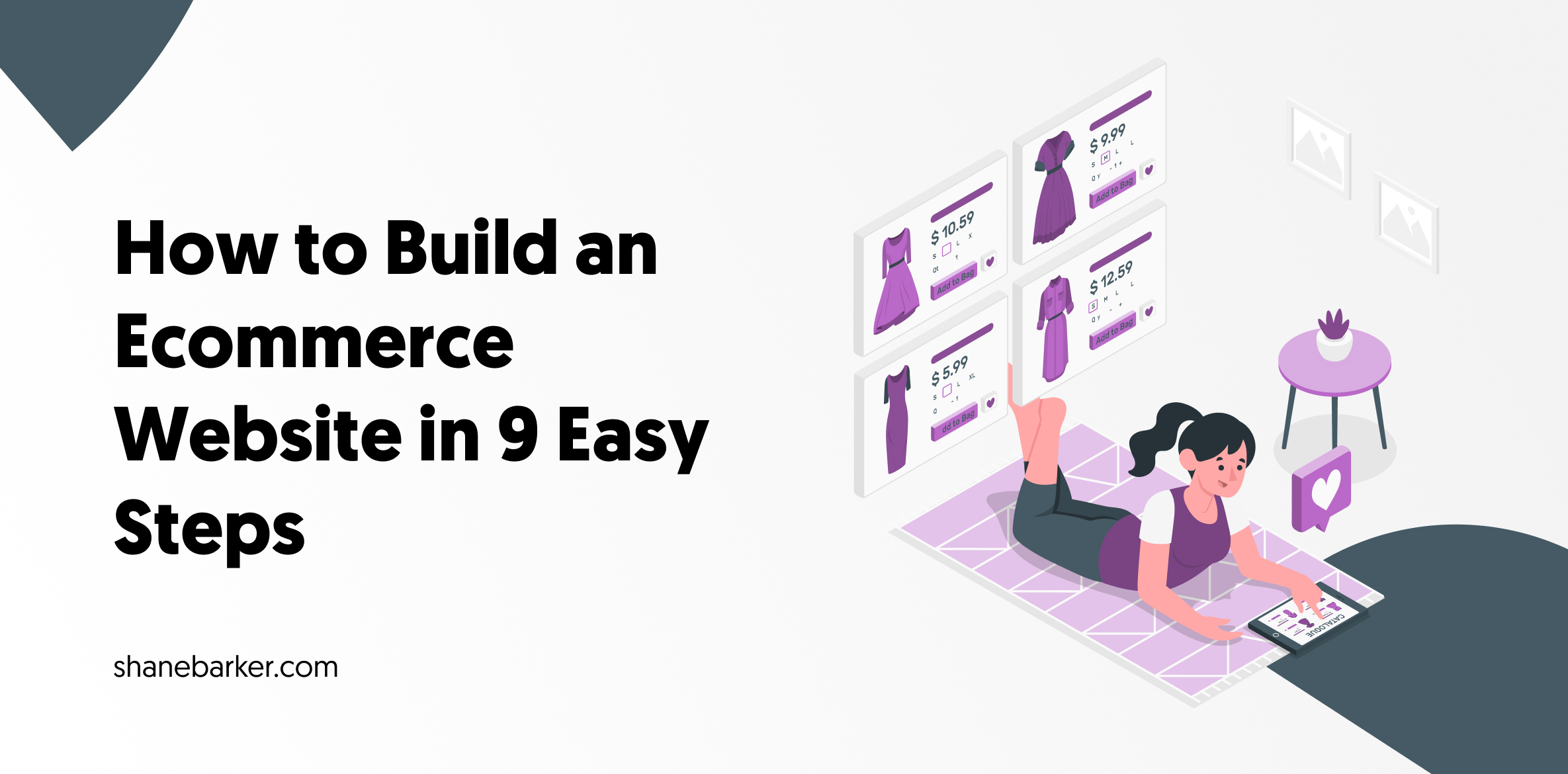
![11 best ecommerce platforms for small businesses in [year] 20 top 11 ecommerce platforms you can use for your small business](https://shanebarker.com/wp-content/uploads/2022/02/118-Top-11-Ecommerce-Platforms-You-Can-Use-for-Your-Small-Business.jpg)
![the world’s top ecommerce companies ([year] list) 21 the world’s top ecommerce companies [2022 list] (1)](https://shanebarker.com/wp-content/uploads/2022/06/The-Worlds-Top-Ecommerce-Companies-2022-List-1.png)
![25 best ecommerce tools to grow your business in [year] 22 25 best ecommerce tools to grow your business in 2022](https://shanebarker.com/wp-content/uploads/2021/11/Blog-Best-Ecommerce-Tools-to-Grow-Your-Business.webp)


This content is well-detailed and easy to understand. Thank you so much.
Hi Disha, thank you so much. I’m glad you like my post about the Best Ecommerce Platforms.